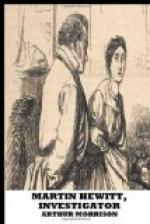“Certainly, come whenever you please. But why see the policemen? They have already most positively stated that they saw nothing whatever suspicious in the house or near it.”
“I shall not ask them anything at all about the house,” Hewitt responded. “I shall just have a little chat with them—about the weather.” And with a smiling bow he turned away, while Lord Stanway stood and gazed after him, with an expression that implied a suspicion that his special detective was making a fool of him.
* * * * *
In rather more than an hour Hewitt was back in Mr. Claridge’s shop. “Mr. Claridge,” he said, “I think I must ask you one or two questions in private. May I see you in your own room?”
They went there at once, and Hewitt, pulling a chair before the window, sat down with his back to the light. The dealer shut the door, and sat opposite him, with the light full in his face.
“Mr. Claridge,” Hewitt proceeded slowly, “when did you first find that Lord Stanway’s cameo was a forgery?”
Claridge literally bounced in his chair. His face paled, but he managed to stammer sharply: “What—what—what d’you mean? Forgery? Do you mean to say I sell forgeries? Forgery? It wasn’t a forgery!”
“Then,” continued Hewitt in the same deliberate tone, watching the other’s face the while, “if it wasn’t a forgery, why did you destroy it and burst your trap-door and desk to imitate a burglary?”
The sweat stood thick on the dealer’s face, and he gasped. But he struggled hard to keep his faculties together, and ejaculated hoarsely: “Destroy it? What—what—I didn’t—didn’t destroy it!”
“Threw it into the river, then—don’t prevaricate about details.”
“No—no—it’s a lie! Who says that? Go away! You’re insulting me!” Claridge almost screamed.
“Come, come, Mr. Claridge,” Hewitt said more placably, for he had gained his point; “don’t distress yourself, and don’t attempt to deceive me—you can’t, I assure you. I know everything you did before you left here last night—everything.”
Claridge’s face worked painfully. Once or twice he appeared to be on the point of returning an indignant reply, but hesitated, and finally broke down altogether.
“Don’t expose me, Mr. Hewitt!” he pleaded; “I beg you won’t expose me! I haven’t harmed a soul but myself. I’ve paid Lord Stanway every penny back, and I never knew the thing was a forgery till I began to clean it. I’m an old man, Mr. Hewitt, and my professional reputation has been spotless until now. I beg you won’t expose me.”
Hewitt’s voice softened. “Don’t make an unnecessary trouble of it,” he said. “I see a decanter on your sideboard—let me give you a little brandy and water. Come, there’s nothing criminal, I believe, in a man’s breaking open his own desk, or his own trap-door, for that matter. Of course I’m acting for Lord Stanway in this affair, and I must, in duty, report to him without reserve. But Lord Stanway is a gentleman, and I’ll undertake he’ll do nothing inconsiderate of your feelings, if you’re disposed to be frank. Let us talk the affair over; tell me about it.”




